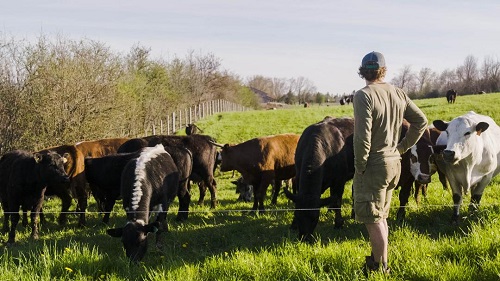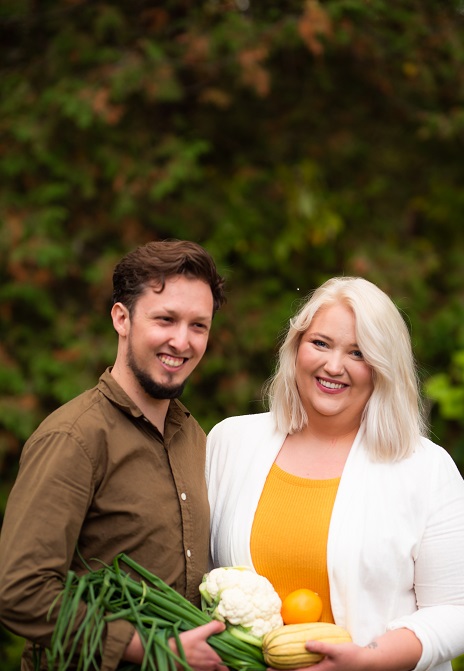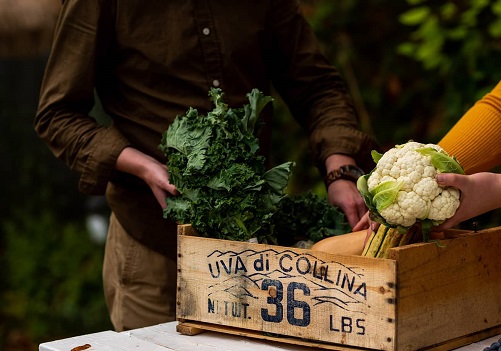Mitchell Good, co-owner and livestock manager at Good Family Farms, believes there is nothing quite like the farm-to-table experience. “Fundamentally and spiritually, we are what we eat,” Good says. “We connect ourselves to the land and food is that connector. Bringing people closer together and to the land is our ethos.”
We are what we eat
Located within Ontario’s Grey Highlands, Good Family Farms has operated since 2015 as an organic food business. The social enterprise centres around regenerative meat production as well as annual row crops and seasonal vegetables. Selling online and through seasonal food markets, Good Family Farms sells fresh pork, beef, chicken, lamb, as well as cured and dried meats. They have also recently expanded to offer sauces and spices, dried goods, flour, and grains.
“We want people to show up and get most of their groceries here,” Good explains. “We source as locally as possible, and everything is certified organic. All of our customers care about the growing of their food.”
Unlike most businesses which have struggled through ever-changing pandemic restrictions, Good Family Farms has experienced the opposite. “When the pandemic hit, demand went up 300%,” Good says. “Luckily, we were already planning on expanding. But for the first six months we were turning people away. Still, we knew we were on the right path.”
Strong focus on quality
Organic agriculture is on the upswing and Good believes this is promising for the future of farming. “When practicing the right agricultural techniques, I do a much better job growing food,” he argues. “Pigs get fed organic grains grown on my farm. Cows are moved to fresh grass each day. The effect on the land is exponentially better than traditional farming practices. I can increase quantity without quality suffering.”
It’s this quality of food that Lyndsay MacKay desperately missed during the early days of the COVID-19 pandemic. With the closing of farmer’s markets and numerous stores carrying only bare essentials, MacKay and her husband had a difficult time locating fresh food.
“People didn’t want to visit stores,” MacKay recalls of the fear and uncertainty of those first few months of the pandemic. “We were finding it hard to get good, fresh produce. And we thought ‘we can’t be the only ones struggling with this’.’” MacKay quickly realized they weren’t. So, borne out of this need, MacKay and her husband started Sprout and Bean Market Box in August 2020 – a weekly delivery service of fresh produce and market goods.
As local as possible
“We set up a menu with different items that work well together,” MacKay explains. “We try to get as local as possible. Recipes inform the ingredients. Then we pack boxes of about eight to ten items and deliver.”
Sprout and Bean’s ingredients differ week-to-week and can include vine tomatoes, bell peppers, asparagus, portobello mushrooms, spring onions, and potatoes. Customers can add a fruit box to their orders which may contain oranges, berries, and melon along with other market goods such as coffee and fresh-baked sourdough loaves. The company processes about 100 orders a week and is continually expanding service across the Georgian Bay area including townships such as Wasaga Beach and Collingwood.
“We want to provide healthy, local food at an affordable cost,” MacKay says. “When you buy local, you support the community. And besides, fresher always tastes better!”
As a social entrepreneur, MacKay is excited for the future of her business. “Our hope is to open a vegan whole foods store,” she says. “We want to turn the online market to an in-person market. Shift our food boxes to pick-up options or build-your-own.”
Grand expansion plans aside, MacKay still craves the simpler things of running a company. “A lot of suppliers don’t know us,” she admits. “It would be nice to go out and meet people and interact with other local businesses. To be able to bounce creative ideas around. After this pandemic, to just to be able to do more face-to-face business would be great.”
What’s the story behind your food?
Through their socially conscious companies, both MacKay and Good feed thousands each month. But Good believes the farm-to-table business model provides more than just food. It provides a visceral and changing experience for customers.
“There’s a story behind the food,” he explains. “Being able to know where your food comes from allows you to take a stronger role in its production. We are creating an emotional connection to food. And the emotional connection ends up being as nourishing as the food.”
Benjamin Rempel is a writer and essayist specializing in public health and social justice. His work has been featured in The Toronto Star, National Observer, Our Canada, The Standard, among many other outlets.




